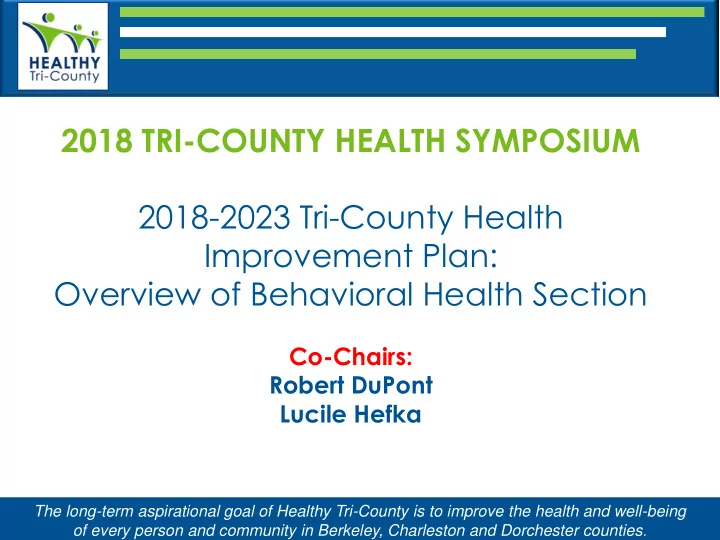

2018 TRI-COUNTY HEALTH SYMPOSIUM 2018-2023 Tri-County Health Improvement Plan: Overview of Behavioral Health Section Co-Chairs: Robert DuPont Lucile Hefka The long-term aspirational goal of Healthy Tri-County is to improve the health and well-being of every person and community in Berkeley, Charleston and Dorchester counties .
GET SOCIAL! #healthytricounty
OVERVIEW • Review goals, recommendations and action steps in the Behavioral Health section of the 2018-2023 Tri-County Health Improvement Plan • Discuss goals, recommendations and action steps of the Behavioral Health section of the 2018-2023 Tri-County Health Improvement Plan • Discuss engagement opportunities for the 2018-2023 Tri-County Health Improvement Plan
GOALS GOAL One: Increase the Tri- County’ Knowledge About Behavioral Health Issues and Services/Resources Rationale: Nearly one in five adults and one in four youth experience a significant behavioral health (mental health/substance use) problem each year National prevalence rates suggest over 160,000 citizens in Tri-County experience a behavioral health disorder; more than half of these individuals likely do not receive treatment Utilization of services for African Americans and Latinos is consistently reported as lower than that of Caucasians Under utilization can be attributed to lack of knowledge of resources and STIGMA Essential the we reduce inequities and increase skills that enable our citizens to recognize and manage their total health, including behavioral health Need to conduct regional awareness campaigns as well as targeted outreach and engagement to understand populations within our community
GOALS GOAL One: Increase the Tri- County’ Knowledge About Behavioral Health Issues and Services/Resources Accomplish Through Various Forms of Community Outreach, Education, Advertising Mental Health Chemical Dependency Tele Health Inpatient and Outpatient
GOALS GOAL Two: Improve Access to Behavioral health Services For All Citizens of the Tri-County Rationale: There are a number of barriers beyond knowledge of resources and stigma Higher concentration of resources in Charleston and Dorchester Counties; Berkeley has been identified as a Health Professional Shortage Area (HPSA) within behavioral health for low-income individuals Barriers in Tri-County area include lack of adequate insurance coverage and parity of coverage, scheduling conflicts, and transportation Looking to increase access through collaboration and use of new strategies-telehealth
GOALS GOAL Two: Improve Access to Behavioral health Services For All Citizens of the Tri-County Measurement: Number of Tri-County Emergency (ED) Visits with a Level One Diagnosis for a Behavioral Health Issue Increase Knowledge Improve Access Make Connection to Current Resources Need to do Before Fully Defining Gaps Data Source: SC Revenue and Fiscal Affairs Office Health Utilization – Online Query System, AHRQ CCS Level 1 Diagnosis Category, Mental Illness
RECOMMENDATIONS & ACTION STEPS RECOMMENDATION: Assess public awareness of 1) knowledge of behavioral health resources and 2) public awareness of behavioral health conditions as treatable, as measured by provider and community surveys, and increase awareness by 10% by 2023. ACTION STEPS 1. Gather tri-county baseline data of behavioral health awareness by December 31, 2019. 2. Develop and implement an education plan for increasing public awareness of behavioral health conditions (e.g. trauma, opioid misuse, drug/alcohol misuse, depression, anxiety, suicidality) by 10% by December, 2023
RECOMMENDATIONS & ACTION STEPS RECOMMENDATION: Identify and reduce barriers (e.g. lack of coverage, outdated legislation, and provider recruitment, training and education) to accessing behavioral health services, and expand where necessary, resulting in increased utilization of current and new behavioral health services by December 2023. ACTION STEPS 1. Identify unknown barriers to accessing mental health services 2. Address known barrier: Support increased use of telehealth 3. Address known barrier: Increase available behavioral health treatment facilities (inpatient and outpatient) 4. Identify and increase current utilization of community health workers including but not limited to Public Health Workers, Care Coordinators/Navigators, Nurse Navigators, Patient Advocates as referral sources for behavioral health providers and to ensure behavioral health patient engagement.
GROUP DISCUSSION What questions or feedback do you have? What additional opportunities do you see for TCHIP implementation specific to Behavioral Health?
JOIN US! Commitment Participate in one meeting per month Volunteer 4-6 hours per month (meetings & independent efforts) TCHIP Workgroup Meetings 4 th Friday, every other month, 12-2pm Next meeting: Jan 25 th , 2019 Behavioral Health Subcommittee Meeting 2 nd Wednesday, every other month, 3:00-4:30 Next Meeting: November 14 th at the Trident Literacy Center
JOIN Collectively we can and will make this happen!
PRESENTER CONTACT INFO INFORMATION Lucille Hefka Trident Literacy Association Lhefka.tridentlit@gmail.com Robert DuPont Trident Health Robert.dupont@hcahealthcare.com
Recommend
More recommend